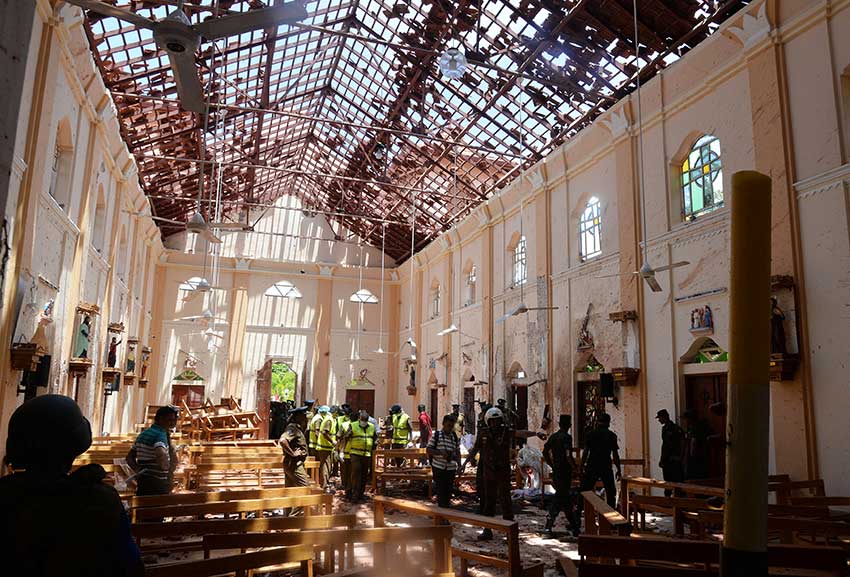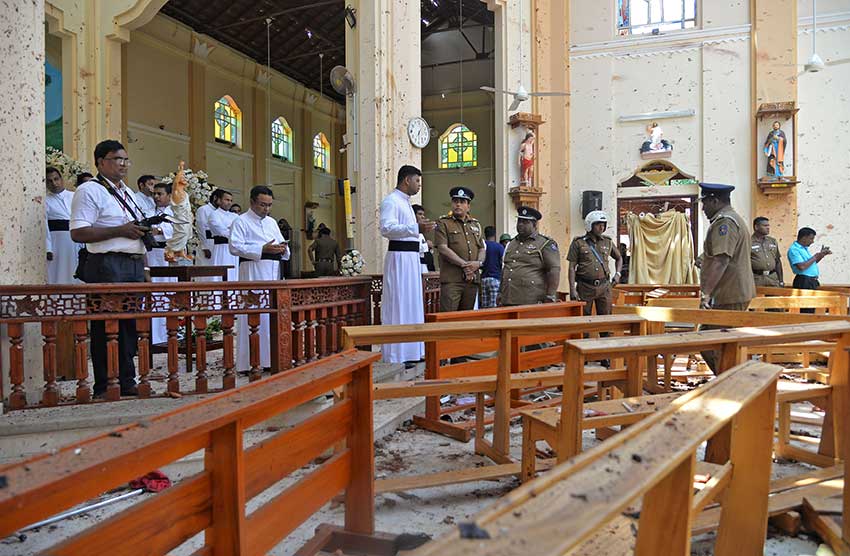
Sri Lankan authorities imposed a curfew across the country starting at 3 pm on Easter Sunday following multiple attacks on three hotels and three churches in Colombo, Negombo, and Batticaloa, the AsiaNews.it website reported.
Related story: Pope leads prayers for Sri Lanka
In the 24 hours following the attacks the death toll rose to 290 and more than 500 wounded. At least nine foreigners are among the dead, including two Australians.
AsiaNews.it is the news website of the Vatican’s Pontifical Institute for Missions.
Curfew imposed, all Sri Lankan schools closed

Sri Lankan police urged the country’s population to stay home and not to visits the blast sites, nor stay outside the hospitals where the victims have been taken.
The Education Ministry has ordered all schools closed for the next two days. The country’s universities will also be closed starting tomorrow until further notice.
Related: Only God can restore the Church, says visiting Sri Lankan evangeliser
In addition to the blasts at the three churches – Zion in Batticaloa, St Anthony’s in Kochchikade, St Sebastian in Negombo – and at the three hotels – Shangri-La, Cinnamon and Kingsbury – there were two other explosions: one at a small hotel near Dehiwela Zoo, in Colombo, and another in a house in Mahawila Gardens, in the Colombo suburb of Dematagoda.
In Australia, Archbishop Anthony Fisher OP prayed for the victims and their families.
“On this Easter Sunday, my thoughts and prayers are with the people of Sri Lanka,” he said in a statement issued on social media.
“It is a sad reminder that many of our fellow Catholics around the world are unable to worship in safety and our holiest celebration may be one of great danger to them.
“My prayers are also with the Sri-Lankan-Australian community concerned about the welfare of friends and relatives back home.
“Our Lady, Queen of Peace, bless and protect the people of Sri Lanka at this difficult time,” he prayed.
Arrests
No one has claimed responsibility for the first six explosions, the deadliest, but police have arrested seven people in connection with the other two.
Of those detained, two were taken into custody over the Dematagoda incident that left three police officers dead.
As messages of solidarity poured in from around the world, including from Pope Francis, Sri Lankan President Maithripala Sirisena condemned the brutal attack on religious and non-religious sites and promised speedy investigations and arrest of the perpetrators of the attacks as well as those behind the conspiracy.

He called on SrI Lankans not to believe rumours and to support the government.
Prime Minister Ranil Wickremesinghe expressed sorrow for the victims and stressed that the attacks would affect the nation and its economy. He also urged the Defence Ministry to “protect law and order” in the country.
Cardinal Malcolm Ranjith, archbishop of Colombo, described the attacks as “bestial and inhuman” and extended his condolences to the families of the dead and wounded. He also called on health professionals to do everything possible to save innocent victims.
Minister says suicide bombers responsible
Some observers speculated that the attacks could be the work of Sri Lankan Muslims returning from the wars in Syria and Iraq however there has been no confirmation of this.
After the attacks, Sri Lanka’s defence minister, Ruwan Wijewardene, said the culprits had been identified and were religious extremists.
He said suicide bombers were responsible for the majority of the morning’s bombings and that the wave of attacks was the work of a single group.
Most of Sri Lanka’s 22 million people are Buddhist and Sinhalese (75 per cent). Tamils are about 18 per cent and mostly Hindu.
Catholics are about 6.8 per cent of the population, divided among different ethnic groups. There is also a substantial Muslim community (9 per cent) that have clashed in the past with fundamentalist Buddhist groups, who have also occasionally targeted Christians.

